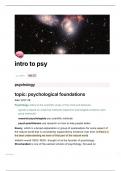intro to psy
term fall 23
psychology
topic: psychological foundations
date: 8/2728
Psychology refers to the scientific study of the mind and behavior.
(good) is based on empirical methods (objective and tangible evidence with
good methods)
research psychologists use scientific methods
psych practitioners use research on how to help people better
theory, which is a broad explanation or group of explanations for some aspect of
the natural world that is consistently supported by evidence over time. A theory is
the best understanding we have of that part of the natural world
wilhelm wundt 18321920 thought of as the founder of psychology.
Structuralism is one of the earliest schools of psychology, focused on
intro to psy 1
, understanding the conscious experience through introspection.
james 18421910- the first american. liked darwin. Functionalism focused on
how mental activities adapted to help an organism fit into its environment.
Functionalism has a second, more subtle meaning in that functionalists were more
interested in the operation of the whole mind rather than of its individual parts. bio
based
freud (not falsifiable)- Psychoanalytic theory focuses on the role of a personʼs
unconscious, as well as early childhood experiences, and this particular
perspective dominated clinical psychology for several decades. also theory of
personality:
id- raw drives, unconscious
ego- conscious and unconscious, rational mind
superego- conscience
theory of development oral, anal, phallic, latency, genital
wertheimer, koffka, kohler- Gestalt roughly translates to “whole;ˮ although a
sensory experience can be broken down into individual parts, how those parts
relate to each other as a whole is often what the individual responds to in
perception. opposes structuralism
Behaviorism is largely responsible for establishing psychology as a scientific
discipline through its objective methods and especially experimentation. In
addition, it is used in behavioral and cognitive-behavioral therapy. the
behaviorists:
pavlov- classical conditioning
john b. watson- observe and control behaviors.
b.f. skinner- behaviorist, reward and punishment aka operant conditioning
1950s) Humanism is a perspective within psychology that emphasizes the
potential for good that is innate to all humans. wanted to broaden and go against
the cynicism of the other theories. humans are more complicated than behaviors.
maslow- need basic needs before achieving potential, hierarchy of needs
rogers- client based therapy
intro to psy 2
, cognitive psychology accepts the use of the scientific methods and rejects
introspection as a method of investigation. acknowledge internal mental states.
includes perception, memory, categorization, knowledge representation,
numerical cognition, language, and thinking
summary: Psychology is an empirically based science that observes
peopleʼs behaviors and emotions. The main theories in psychology
include, structuralism, functionalism, behaviorism, humanism,
psychoanalytic, gestalt, and cognitive psychology. Structuralism uses
introspection to reveal pieces of oneʼs thoughts whereas functionalism is
based in biology, meaning its focus is on how such thoughts are adapted
to help organisms survive. Psychoanalytic theory focuses on the
unconscious mind and how childhood impacts our present lives and
ways of thinking. Gestalt opposes structuralism by emphasizing how
individuals react to things in the context of the whole rather than the
parts. Behaviorism is about being able to observe and modify behaviors
whether through rewards, punishments, or conditioning. Humanism is
optimistic and believes all people are more complicated than their
behaviors. Cognitive psychology is the most modern and combines
pieces of each of these to provide therapy and services for modern
people.
topic: contemporary fields of psychology
date: 9/1
the five pillars as designated by the APA
biological, cognitive, developmental, social and personality, mental and
physical health
all of these are built on research methods
biological
intro to psy 3
, biopsychological*- how bio influences behavior. behavioral neuroscience,
cognitive neuroscience, neuropsychology
evolutionary psychology- how human behavior and cognition evolved
sensation and perception- interdisciplinary. physiological and psychological
experience of sensory information
cognitive
thoughts and their relationship to their experience and actions
language, cognition, memory, intelligence
developmental
behavioral and learning or conditioning
classical and operant conditioning
developmental psychology- development across a lifespan
stages and milestones of development
social and personality psychology
social psychology*- study of how peopleʼs thoughts, feelings, and behaviors
are influenced by the actual or implied presence of others. how do others
modify our behaviors, thoughts, and actions?
unusual situations and their impact
personality psychology- study of patterns of thoughts and behaviors that make
the individual unique. inner, more stable
whatʼs consistent?
personality traits- consistent pattern of thought and behavior and
examines individual differences
five factor model of personality- OCEAN. relatively stable.
openness, conscientious, extroversion, agreeableness, neuroticism
mental and physical health
abnormal psychology- focuses on abnormal thoughts and behaviors.
not common
intro to psy 4




